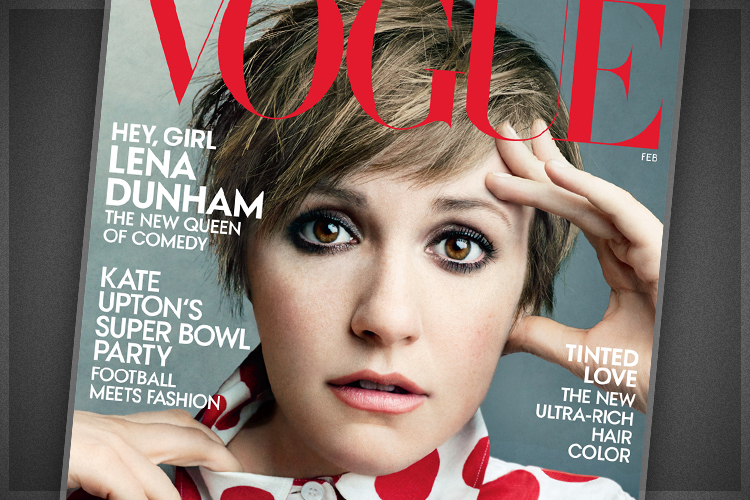Today, popular website Jezebel offered $10,000 to anyone who can provide them with unretouched photos from Lena Dunham’s recent shoot for Vogue. Jezebel is shrouding this bounty in the guise of righteousness, offering a list of the women whose images have been previously retouched by Vogue — Cheryl Strayed, Gwyneth Paltrow, Lady Gaga, Kate Winslet — but it seems like something else is going on here.
In 2007, Jezebel first offered such a bounty for an unretouched magazine cover photo and it was a fascinating, useful experiment. This kind of calling out had not been done before, particularly not in such a high-profile manner. The winner was a Redbook cover featuring country singer Faith Hill, and the site offered an 11-point annotation of how Hill’s image was retouched. The singer was given more hair, her cheeks were whittled, her clavicle was removed, and so on. The series of posts was excellent because it showed how even a beautiful woman was not beautiful enough for glossy magazines.
But it’s bizarre that Jezebel is once again taking Vogue to task for being Vogue — a fashion magazine essentially predicated upon providing its readers with unrealistic, highly retouched images of unrealistically beautiful women. Jezebel and other publications have already made the salient point ad nauseam.
There are still important conversations to be had about body image and what the fashion industry and fashion magazines do to warp our ideas about the ideal body and ideal beauty. But Jezebel’s most recent bounty isn’t trying to be part of a productive conversation. It’s a blatant attempt to drive traffic to the site, and yes, here I am, contributing to that drive.
Certainly, there is something of a contradiction in seeing Dunham on the cover of Vogue. She openly advocates for body image positivity and then appears in a fashion magazine that has no interest in such positivity. But people are allowed to be inconsistent, even when they are in the public eye. I don’t see Dunham agreeing to appear in Vogue as a problem. I see Dunham’s choice as one made by a young woman, at a peak moment in her career, being human, enjoying this moment in the sun.
We all have our vanities. The retouching magazines like Vogue do is the professional version of the retouching we do when we, for example, apply Instagram filters to the pictures we take and share on our social networks. Most people are interested in making reality look slightly better. If I were ever to grace the pages of Vogue, I would want my image retouched because the audience is so vast. There is great vulnerability in being exposed to that many judging eyes. I feel no small amount of guilt over this willingness to surrender my ideals. It contradicts so much of what I believe in about body positivity and aggressively challenging unrealistic beauty standards. Maybe I’ve been too socially conditioned. Maybe I’m too old. Maybe I’m too vain. But I can own it. If I am ever in the spotlight, I want to look good. I want to think, “I woke up like this.” I suspect the same holds true for Lena Dunham.
There is something highly disingenuous about Jezebel’s latest bounty offer, an unspoken slyness because this is Lena Dunham we’re talking about. An inordinate amount of attention has been given to Dunham’s normal-size body, the kind of body most of us live in and see every day of our lives. In Hollywood, a normal-size body is unruly. It must be tamed, and it seems that Jezebel has fallen prey to these pressures.
Since the premiere of “Girls,” Dunham’s body and her looks have been a source of cultural fascination, particularly because she is unabashed in displaying her body in intimate, awkward, vulnerable, utterly human moments. We see unretouched images of Dunham on nearly every episode of “Girls.” If Jezebel merely wanted screenshots of Dunham’s body, a couple million people could provide those.
There’s also the small matter of inflation. Jezebel’s bounty hasn’t increased in a decade? Ten thousand dollars is a lot of money to many people, but it is not nearly enough money for the people with access to Dunham’s unretouched images (probably no more than a handful of Vogue staffers) to take such a risk. Jezebel editor Jessica Coen is intelligent. She knows she will likely never get these images. I’m sure we all wish this bounty was about some higher principle but the ploy is cynical capitalism — nothing more, nothing less.
Update: Jezebel got the unretouched photos after all, in about two hours. I was surprised until I remembered that people are people. What’s particularly interesting is that the retouching is quite standard for a glossy fashion magazine. Retouched or not, Lena Dunham looks like Lena Dunham in Vogue, and I am left wondering what the point of all this was beyond driving traffic. I am left wondering about all the charities that could have used that $10,000 like RAINN, Planned Parenthood, or Girls Write Now. The list is long. People are people.

